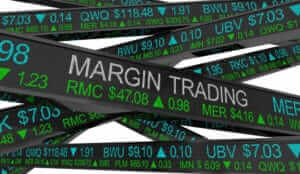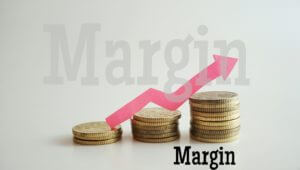Leverage
There is a close relationship between the Leverage and Margin. That is, both go hand in hand. In simple terms, the margin is used to create leverage. The meaning of leverage is similar to the margin. It is a facility provided by brokers, which allows a trader to take larger positions by investing a lesser amount than required.
Margin is expressed in percentage, while Leverage is expressed as a ratio
Leverage is the ratio between the capital a trader has in their account to the amount of capital he/she can trade. And this ratio is expressed in the form “X:1,” where X is the amount of leverage.
Expressing Margin in terms of Leverage
If a trader wishes to purchase one mini lot of a currency, they don’t need $1,000 in their account balance. Instead, they will need only a small percentage of the position size. And this percentage is referred to as Margin Requirement.
This same percentage in terms of a ratio is termed as Leverage.
For example, let’s say John wants to buy 100,000 units of USD/CAD. If the Margin Requirement is 1%, John will require only $1,000 to take this trade. That is, the Leverage for this trade would be 100:1.
Calculating the Leverage
Leverage is calculated using the below formula
Leverage = 1 / Margin Requirement
Considering the above the example,
Leverage = 1 / 0.01
Leverage = 100
Hence, the leverage will be 100:1.
Similarly, if the Margin Requirement is 2%, the Leverage will be 50:1.
Conversely, using Leverage, we can obtain the Margin Requirement as well.
Margin Requirement = 1 / Leverage
For example, if the Leverage is 500:1, the Margin Requirement = 1 / 500 = 0.002
Hence, the Margin Requirement when Leverage is 500:1 will be 0.002 or 0.2%.
Mostly, Margin and Leverage have an inverse relationship.
Forex Margin and Stock Margin
Forex margin and Stock (Securities) margin are two completely different terms, though both are from the same trading industry.
In the Stock market, the margin is the amount a trader borrows from their broker to purchase a stock. Basically, it is like borrowing funds as a loan from their broker.
Whereas in the Forex market, the meaning of margin is different. Here, as we know, it is the amount of money a trader will have to keep aside with the broker as a deposit to open a margin position.
Hence, to sum it up, we can consider margin either as a loan provided by the brokers or as collateral collected by the respective brokerage firm. [wp_quiz id=”52027″]






